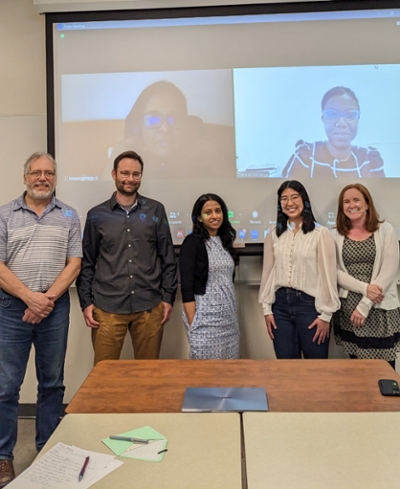Master's in Environmental and Social Change Program Celebrates First Defenses
Mon. Jul. 17, 2023
The Master's in Environmental and Social Change (MESC) program welcomed its first cohort of students in September 2021. In May 2023, the program celebrated its first thesis examination as Haven Soto defended Quantifying the Concentration and Loads of Dissolved Organic Contaminants in Snowmelt Runoff from Manure-Amended Agricultural Fields.
We checked in with Haven to learn more about her interest and time in the program.
 What inspired or encouraged you to enroll in the Master in Environmental and Social Change program at The University of Winnipeg? What interested you about the program?
What inspired or encouraged you to enroll in the Master in Environmental and Social Change program at The University of Winnipeg? What interested you about the program?
What really drew me in was the interdisciplinary nature of the program. Students had the ability to work with other students in different fields to understand how our research connects to other fields in a wholistic way and how it impacts the world. I was also really excited to work with my supervisors Dr. Nora Casson and Dr. Inoka Amarakoon because of their research interests and I had heard great things about both of them from other students and faculty.
Can you tell us about the program and your research focus?
I graduated from the Master of Science stream, studying how much antibiotics and natural steroids are introduced into surface and groundwaters from snowmelt that collected over manure-amended agricultural fields during the spring-snowmelt period. It is really important to study this because the spring-snowmelt is a critical period in the Prairies. Studies have shown the snowmelt has resulted in an increase of nutrients (e.g., phosphorus) being introduced into the environment, but not much is known about how much organic contaminants are introduced. In general, the introduction of antibiotics and steroids have shown to increase the presence of antibiotic resistant genes in soil microbes and a disruption of physiological development in animals, respectively. Therefore, knowing if and how much of antibiotics and steroids are introduced into surface and groundwaters via snowmelt is a first step in trying to mitigate losses.
What was the highlight of your thesis research for you?
The highlight for me was how many different topics I needed to learn about in order to run my research and write the thesis. It took a lot of time and effort to be able to put together the different components required to understand my research as a whole picture. Some of the things I had to learn about included soil science, hydrology, how antibiotics and steroids work, the agriculture industry, and so much more. It was an accepted challenge on my part.
You are amongst the first cohort to graduate from the Master in Environmental and Social Change program. What are you going to take away from your experience?
I really want to emphasize how welcoming and kind everyone was in the program, and I hope that the environment we fostered as the first cohort continues on for future cohorts. It was such a pleasure to interact with the other students and faculty.
Any advice you’d like to share with prospective graduate students?
It’s cliché, but students should really take their time to enjoy every part of it. The work will always be there, but working with amazing people and creating strong relationships is just as important. I would also say to make use of all the resources available to graduate students! If you’re not familiar with what’s available, our student society (MESCSS) has wonderful folks who are a great resource.
Thanks, Haven! We’re looking forward to seeing what you do in the future!
Since Haven's defense in May, the MESC program has celebrated several other successful defenses including Nathalie Turenne's, Patrick Carty's, and Emily Unger's.
